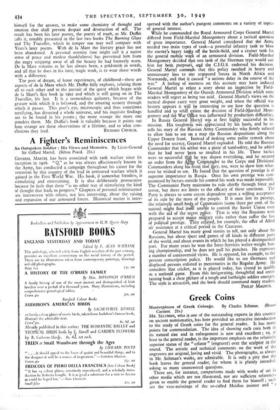A Fighter's Reminiscences
An Outspoken Soldier : His Views and Memoirs. By Lieut-General Sir Giffard Martel. (Sifton Praed. 21s.)
GENERAL MARTEL has been associated with tank warfare since its inception in 1916. " Q," as he was always affectionately known in the Army, has conducted a campaign throughout his career for the retention by this country of the lead in armoured warfare which it gained in the First world War. His book, if somewhat formless, is stimulating and entertaining. It is also deliberately provocative because he feels that there " is no other way of stimulating the kind of thought that leads to progress." Chapters of personal reminiscence are interwoven with. others, not less interesting, about the raising and expansion of our armoured forces. Historical matter is inter- spersed with the author's pungent comments on a variety of topic, of general interest.
While he commanded the Royal Armoured Corps General Mattel differed from Field-Marshal Montgomery about a tactical question of great importance. General Martel considered that the Army needed two main types of tank—a powerful infantry tank to blow the enemy's heavy tank; off the battle-field, and a cruiser tank for the general mobile work of an armoured division. Field-Marshal Montgomery decided that one tank of the Sherman type would suit him for both purposes, and the C.I.G.S. endorsed his decision. General Martel contends that this policy resulted in heavy and unnecessary loss to our armoured 'forces in North Africa and Normandy, and that it caused a serious delay in the course of the war." A feeling of soreness on this account may have induced General Martel to relate a story about an inspection by Field- Marshal Montgomery of the Guards Armoured Division which some readers will regret as being too acid. General Martel's views on the tactical dispute carry very great weight, and when the official war history appears it will be interesting to see how the question is handled and to what itent the decision of Field-lvjarshal Mont- gomery and the War 0 ce was influenced by production difficulties.
In Russia deneral arts). was at first highy successful in his
h mission. His toughneis was appreciated by his hosts, and he re- tells his story of the Russian Army Commander who firmly refused to allow him to sec on a map the Russian dispositions along the Upper Donetz front. Instead of making some polite remark about the need for secrecy, General Martel exploded. He told the Russian Commander that his action was a piece of tomfoolery, and he added that he had never cep so instilted in his life. These tactics were so successful t ' he was shown everything, and he secured an order from the y coinmander to the Corps and Divisional Commanders along his ront thaithey, too, were to show him what- ever he wished to see. He found that the question of prestige is of supreme importance in Russia. Once his own prestige was com- promised by factors outside his control his work was made impossible. The Communist Party maintains its rule chiefly through force and terror, but there are limits to the efficacy of these sanctions. The Party is always to some extent dependent upon a willing acceptance of its rule by the mass of the people. If it once lost its prestige, the relatively small body_of Cinmunists (some three per cent. of the nation) aught find its6lf unable to control the Soviet Union even with the aid of the secret p lice. That is why the Russians were prepared to accept major nu tary risks rather than suffer the loss of political prestige. They re nied, for example, the offer of Allied air assistance at a critical period in the Caucasus. General Martel has many good stories to tell, not only about the Russians, but about (port and games of all kinds in different parts of the world, and about events in which he has played a distinguished part. For many years he won the Inter-Services welter-weight box- ing championship, and he does not pull his punches. He expresses a number of controversial views. He is opposed, for example, to the present conscription policy.' He would like to see Germans and displaced persons enlisted as mercenaries in the Regular Army. He considers that cricket, as it is played today, has ceased to qualify as a national game. From this invigorating, thoughtful and enter- taining book a clear giciure of a tough and forthright soldier emerges. The style is attractive, and the book should command many readers.
PHILIP MAGNUS.














































 Previous page
Previous page